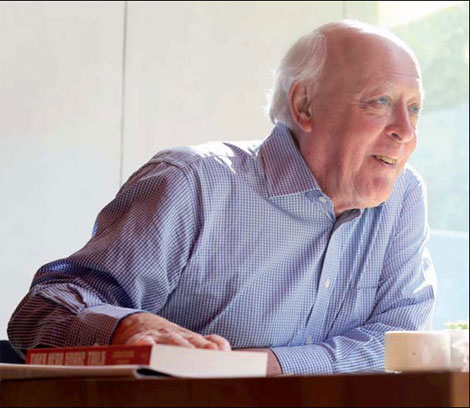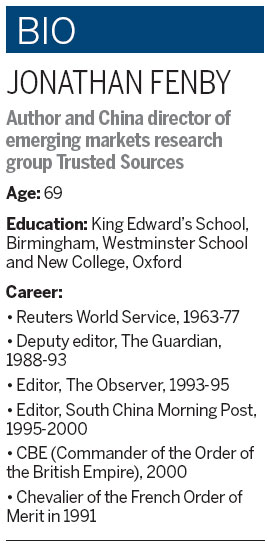Making head and tail about China
Updated: 2012-03-30 07:40
By Andrew Moody (China Daily)
|
||||||||
|
Jonathan Fenby says there are number of potentially difficult obstacles for China to continue its economic success. [Wang Jing / China Daily] |
Author believes next 30 years will be tougher than last three decades for Chinese economy
Jonathan Fenby says it is very easy to have one opinion about China in the morning and then an opposing one in the afternoon.
The 69-year-old was back in Beijing to promote his new book Tiger Head Snake Tails, China Today, How it Got There and Where it is Heading.
It wrestles with many of the current issues facing the world's second largest economy that continue to confound China experts.
"I have a couple of pages which may not make me very popular with eminent commentators who write about China when I say that the China bulls and bears are both right and wrong at the same time," he says.
"It was the Sinologist Rick Baum who said you can come up with an idea in the morning and find all the evidence you need to take the opposite position by the afternoon. There is a lot of that about today."
Fenby, tanned from lecturing on a cruise that took in Vietnam and Singapore, in his blazer and slacks looks slightly at odds with the Japanese urban chic of The Opposite House Hotel in the Sanlitun entertainment district.
The former editor of the South China Morning Post and The Observer in the UK, is a man, however, of prodigious energy. Tiger Head Snake Tails is his 12th book in 14 years and his sixth with a China theme.
Since coming out with the Penguin History of Modern China in 2008, he has polished off a full-scale biography of Charles de Gaulle and produced his latest 400-page one volume state-of the-China-nation account.
Apart from this, he has a three-out-of-every-four-weeks day job as China director of Trusted Sources, an emerging markets research body, which also takes him all round the world.
"People say that I must do without sleep like Margaret Thatcher. I actually sleep quite a lot. Last night I slept for 10 hours," he says.
He says the key to his prolific writing is to work at weekends from early Saturday to Sunday evening when he has a regular session of the French card game Belote with neighbors in his London mansion apartment.
The idea behind Tiger Head Snake Tails came about because he thought there was no single volume book encompassing all the key issues of contemporary China.
"There have been a number of good books on specific aspects of China, political, social and economic, regional and environmental but it suddenly occurred to me there was no one book that brought all this together," he says.
|
|
The book presents the many challenges of China and presents an argument the next 30 years are going to be far more difficult then the period since reform and opening up in the late 1970s.
"The underlying conclusion is that even when you take into account the huge challenges and difficulties of 30 years of economic reform, this first stage may have been the easier part," he says.
He says there are number of potentially difficult obstacles on the horizon if China is to continue its economic success.
"We are getting into a position where labor rates are going up so a low-cost wage economy becomes more difficult, capital is becoming less easy for a lot of entrepreneurs and external markets are becoming much less welcoming, partly because of the recession in Europe and soggy growth in America. There is also this political push back from the French and others saying that all our jobs are going to China and that this is wrong."
Fenby insists, however, that whatever the difficulties China might encounter, it is not going to go off the rails.
"No, it can't. Because of this," he says, as he points to the modern 21st century ambience around us as we were having morning coffee.
Fenby believes the reforms put in place by Deng Xiaoping - who he says in his book changed the world in contrast to Mao who just changed China - run very deep.
"At the end of the day you have got a system - as Deng set it up in the 1970s - that has the resources and ambition to keep it all going whatever," he says.
Fenby, who has the distinction of being both a CBE (Commander of the Order of the British Empire) in the UK and also the Chevalier of the French Order of Merit, only started work on the book early last year at his son's house in Bali.
"I was alone for about four days and I said to myself that I was really going to crack this. I thought what the book needed was a short introduction and at the end of this time I had produced something that was as long as 80 pages which wasn't much good," he says.
He visited Beijing three times and Shanghai twice as well as Chong-qing and Jiangsu province during the writing.
"I just go round visiting people I know, a mixture of Chinese and foreign academics, journalists, people running think tanks, financial analysts and investors. I don't quote people in the book. It is based on my evaluation," he says.
Fenby, the son of a distinguished regional newspaper journalist, began his career at Reuters in Paris after leaving New College, Oxford.
With the international news agency, he covered the Vietnam War, before going on to be deputy editor of The Guardian and then editor of The Observer.
It was his sudden dismissal from the world's oldest Sunday newspaper that led to the China connection. He was headhunted by the South China Morning Post to be its editor in 1995. "I was 53 and had never been to China before I went to Hong Kong," he says.
Fenby says it is very difficult to make predictions about China but believes the arguments put forward by Martin Jacques who is coming out with a second edition of When China Rules the World at the same time as Tiger Head are too simplistic.
"Of course China's effect on the world will be very important but the more important question is perhaps the impact of China's rise on China itself," he says.
"You can't have an economy of that weight and importance in the world that, for instance, controls interest rates, has a State-owned capital sector which has no private ownership of land and which restricts labor movements through the hukou (household registration) system as well as restricting energy prices to a third or a quarter of what they would otherwise be."
He also dismisses concepts that China is uniquely different to other countries in that it is a Confucian civilization state - another Jacques' contention - rather than a nation state.
"China is a Confucian state much in the same way as Britain is still a Christian nation. I think the society has become so disparate, so international and so fragmented," he says.
Fenby's next project is to write a biography of Ferdinand Lesseps, the French diplomat behind the Suez Canal, which will take him to Egypt and northern France to do research.
He believes it is an interesting time for China and he will still be keeping a close eye on developments.
"I think whether the glass is half full or empty depends on your mindset. With Trusted Sources I had a conference call with a Latin American client recently who said my outlook for China in 2012 was bearish," he recalls.
"I gave the same analysis to someone later in the day and he said it was the most bullish analysis he had heard in a long time."
andrewmoody@chinadaily.com.cn

 Relief reaches isolated village
Relief reaches isolated village
 Rainfall poses new threats to quake-hit region
Rainfall poses new threats to quake-hit region
 Funerals begin for Boston bombing victims
Funerals begin for Boston bombing victims
 Quake takeaway from China's Air Force
Quake takeaway from China's Air Force
 Obama celebrates young inventors at science fair
Obama celebrates young inventors at science fair
 Earth Day marked around the world
Earth Day marked around the world
 Volunteer team helping students find sense of normalcy
Volunteer team helping students find sense of normalcy
 Ethnic groups quick to join rescue efforts
Ethnic groups quick to join rescue efforts
Most Viewed
Editor's Picks

|

|

|

|

|

|
Today's Top News
Chinese fleet drives out Japan's boats from Diaoyu
Health new priority for quake zone
Inspired by Guan, more Chinese pick up golf
Russia criticizes US reports on human rights
China, ROK criticize visits to shrine
Sino-US shared interests emphasized
China 'aims to share its dream with world'
Chinese president appoints 5 new ambassadors
US Weekly

|

|









